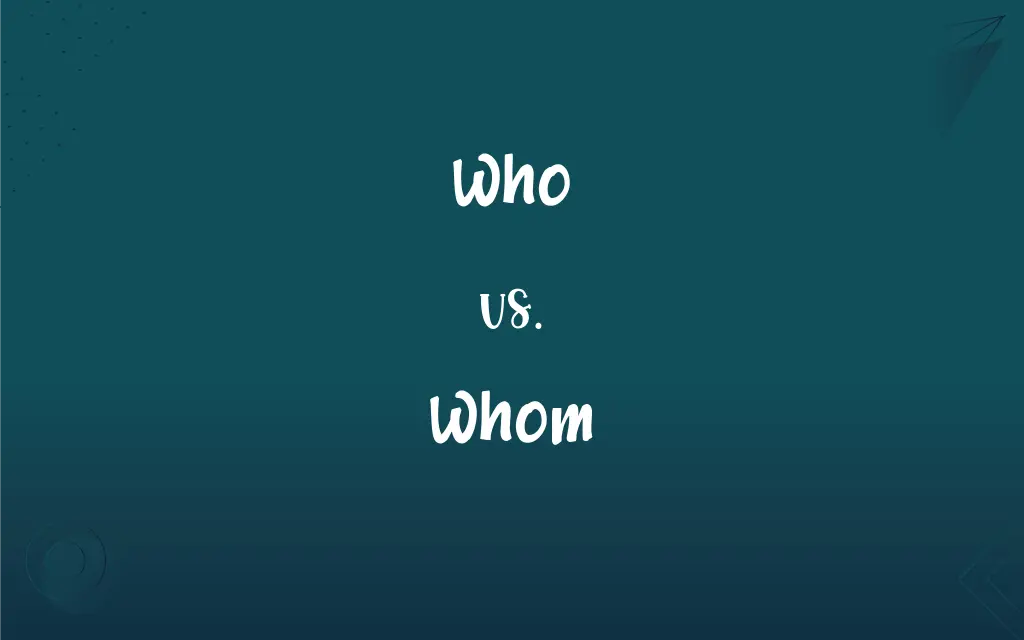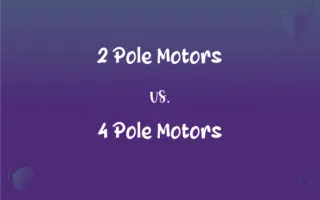Who vs. Whom: What's the Difference?
Edited by Janet White || By Harlon Moss || Updated on October 24, 2023
"Who" is a subject pronoun, while "whom" is an object pronoun; "who" does an action, "whom" receives it.

Key Differences
"Who" is employed when referring to the subject of a sentence, whereas "whom" is appropriate when referencing the object of a verb or preposition.
If you're questioning the doer of an action, "who" is your go-to; if you're inquiring about the receiver of that action, opt for "whom".
Think of "who" as the one taking action, akin to "he" or "she". Conversely, "whom" is like "him" or "her", the individual on the receiving end.
A handy trick to decide between "who" and "whom" involves rephrasing the sentence with "he" or "him". If "he" fits, use "who"; if "him" sounds right, "whom" is your choice.
Comparison Chart
Pronoun Type
Subject pronoun
Object pronoun
ADVERTISEMENT
Example Query
Who did it?
To whom did you give it?
Corresponding Pronouns
He, She
Him, Her
Position in Sentence
Typically before a verb
Typically after a verb or preposition
Example with Preposition
Who is at the door?
With whom are you going?
Who and Whom Definitions
Who
Used to inquire about identity.
Who is the author of this book?
ADVERTISEMENT
Whom
Used to question about a specific individual as an object.
To whom did you give the letter?
Who
A word that stands in for a subject.
Who is calling?
Whom
A word referring to the object of a verb or preposition.
Whom did you invite?
Who
A word indicating the performer of an action.
Who wants some ice cream?
Whom
The correct choice when preceded by a preposition.
By whom was this painting made?
Who
A query word for seeking a person's identity.
Who told you that secret?
Whom
An interrogative pronoun inquiring about the receiver.
Whom are they blaming for the error?
Who
An interrogative for unknown subjects.
Who broke the vase?
Whom
A formal version of 'who' when the latter acts as an object.
Whom shall I say is calling?
Who
(interrogative) What person or people; which person or people; asks for the identity of someone; used in a direct or indirect question.
Who is that? (direct question)
I don't know who it is. (indirect question)
Whom
(interrogative) What person or people; which person or people.
FAQs
Can you give a simple trick to choose between "who" and "whom"?
Absolutely! If you can replace it with "he", use "who". If "him" fits, use "whom".
Is "whom" still commonly used in everyday speech?
While grammatically correct, "whom" is often replaced with "who" in casual speech, but remains in formal writing.
And when is "whom" appropriate?
Use "whom" when referring to the object of a verb or preposition.
Why is there confusion between "who" and "whom"?
The distinction is subtle, and casual speech often blurs the lines, leading to confusion.
When should I use "who" in a sentence?
Use "who" when referring to the subject or the doer of the action in the sentence.
Can I start a question with "whom"?
Yes, especially when it's the object of a verb or preposition, like "Whom did you see?"
Is it always wrong to use "who" in place of "whom"?
In informal speech, many native speakers use "who" where "whom" is technically correct. However, in formal contexts, it's important to use them properly.
Are there regions where "whom" is more prevalent?
Not necessarily, but the use of "whom" may be more common in formal settings regardless of region.
Can I use "whom" in statements, not just questions?
Yes, like in "She's the one whom I told."
Is it wrong to say "Who did you give it to?"
While many native speakers say this in casual speech, the formal version would be "To whom did you give it?"
Are there other words related to "who" and "whom"?
Yes, like "whose" which is a possessive form.
Can "whom" be the subject of a verb?
No, "whom" is an object pronoun and shouldn't act as the subject.
Is "whomever" the same as "whom"?
"Whomever" is to "whom" as "whoever" is to "who". They're more emphatic forms.
Do all English style guides agree on "who" vs. "whom"?
While the basic rules are consistent, some style guides may have specific nuances or exceptions.
How long have "who" and "whom" been part of the English language?
Both words have Old English origins, making them centuries old.
Why do some people avoid using "whom"?
Some find "whom" old-fashioned or aren't sure how to use it correctly, so they stick to "who".
Do other languages have this "who" vs. "whom" distinction?
Yes, many languages have different forms for subject and object pronouns, though the rules can vary.
In what scenarios is "whom" most frequently misused?
"Whom" is often misused after prepositions, like "for" or "with", where it's correct but replaced by "who" in casual speech.
Can I end a sentence with "whom"?
Yes, like in "I don't know whom."
Is there a trend regarding the use of "who" and "whom"?
"Whom" is becoming less common in everyday speech but still maintains its place in formal writing and contexts.
About Author
Written by
Harlon MossHarlon is a seasoned quality moderator and accomplished content writer for Difference Wiki. An alumnus of the prestigious University of California, he earned his degree in Computer Science. Leveraging his academic background, Harlon brings a meticulous and informed perspective to his work, ensuring content accuracy and excellence.
Edited by
Janet WhiteJanet White has been an esteemed writer and blogger for Difference Wiki. Holding a Master's degree in Science and Medical Journalism from the prestigious Boston University, she has consistently demonstrated her expertise and passion for her field. When she's not immersed in her work, Janet relishes her time exercising, delving into a good book, and cherishing moments with friends and family.































































